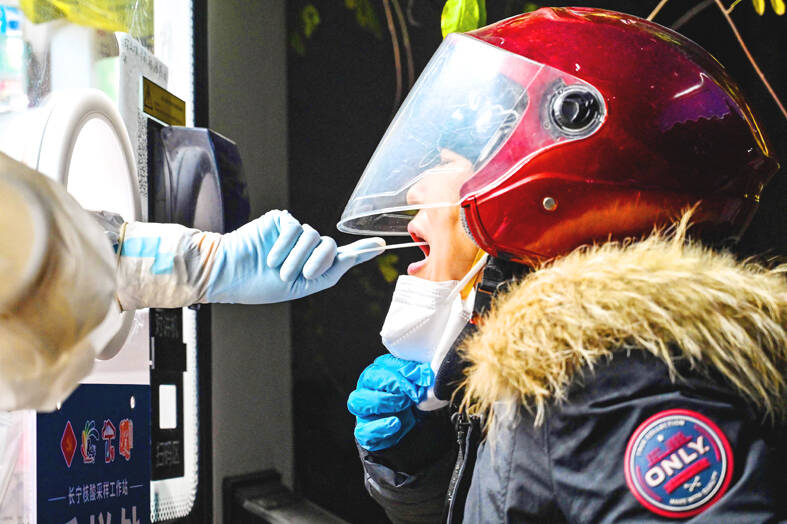The Chinese National Health Commission (NHC) yesterday ceased publishing daily COVID-19 data amid doubts about the reliability of numbers, as infections explode in the wake of an abrupt easing of tough restrictions.
“Relevant COVID information will be published by the Chinese Center for Disease Control and Prevention for reference and research,” the commission said in a statement.
It did not specify the reasons for the change or how frequently the center would update COVID-19 information.

Photo: AFP
The NHC’s halt to reporting daily infection and death totals comes as concerns grow around the lack of vital information since Beijing made sweeping changes to a “zero COVID” policy that had put hundreds of millions of its citizens under relentless lockdowns and battered the world’s second-largest economy.
Despite a record surge of infections, the NHC had reported no COVID-19 deaths nationwide for four consecutive days before halting the data release. China narrowed its definition for reporting COVID-19 deaths, counting only those from pneumonia or respiratory failure caused by the disease.
British-based health data firm Airfinity last week said that China was experiencing more than 1 million infections and 5,000 deaths per day.
The NHC this month stopped reporting asymptomatic infections, making it harder to track cases.
Official figures from China had become an unreliable guide as less testing was being done across the country, while China has been routinely accused of downplaying infections and deaths.
The US has also reported COVID-19 cases less frequently, changing from daily to weekly updates, citing needs to reduce the reporting burden on local areas.
The WHO has received no data from China on new COVID-19 hospitalizations since Beijing eased its restrictions. The organization said the data gap might be due to the authorities struggling to tally cases in the world’s most populous country.
“China is entering the most dangerous weeks of the pandemic,” a research note from Capital Economics said. “The authorities are making almost no efforts now to slow the spread of infections and, with the migration ahead of Lunar New Year getting started, any parts of the country not currently in a major COVID wave will be soon.”
After years of enforcing strict measures, Chinese President Xi Jinping’s (習近平) abandonment of his signature “zero COVID” policy now puts a spotlight on the country’s exit plan as Hong Kong plans to reopen China’s border.
China’s abrupt easing of restrictions, including the dismantling of widespread mass testing, had confused its citizens and stoked frustrations as cases soared while official numbers remained incomplete.
“You didn’t count me when I was positive for COVID and you didn’t know when I turned negative. The statistics and reality are too far apart,” a social media user wrote after the NHC halted its daily case reporting, adding that there has been no need to publish them for quite a while.
The cities of Qingdao and Dongguan have each estimated tens of thousands of daily COVID-19 infections in the past few days, much higher than the national daily toll without asymptomatic cases.
Several recent models and reports have forecast as many as 2 million COVID-19 deaths as the virus spreads to vulnerable people in rural sections of the country.
The country’s healthcare system has been under enormous strain, with staff being asked to work while sick, and even retired medical workers in rural communities being rehired to help grassroots efforts, state media reported.
Bolstering the urgency is the approach of the Lunar New Year holidays in January, when enormous numbers of people return home.
Daily requests to the emergency center in the eastern city of Hangzhou have more than tripled on average from last year’s level, state television reported yesterday, citing a Hangzhou health official.
Suzhou, also in the east, on Saturday said its emergency line received a record 7,233 calls on Thursday.

MONEY GRAB: People were rushing to collect bills scattered on the ground after the plane transporting money crashed, which an official said hindered rescue efforts A cargo plane carrying money on Friday crashed near Bolivia’s capital, damaging about a dozen vehicles on highway, scattering bills on the ground and leaving at least 15 people dead and others injured, an official said. Bolivian Minister of Defense Marcelo Salinas said the Hercules C-130 plane was transporting newly printed Bolivian currency when it “landed and veered off the runway” at an airport in El Alto, a city adjacent to La Paz, before ending up in a nearby field. Firefighters managed to put out the flames that engulfed the aircraft. Fire chief Pavel Tovar said at least 15 people died, but

LIKE FATHER, LIKE DAUGHTER: By showing Ju-ae’s ability to handle a weapon, the photos ‘suggest she is indeed receiving training as a successor,’ an academic said North Korea on Saturday released a rare image of leader Kim Jong-un’s teenage daughter firing a rifle at a shooting range, adding to speculation that she is being groomed as his successor. Kim’s daughter, Ju-ae, has long been seen as the next in line to rule the secretive, nuclear-armed state, and took part in a string of recent high-profile outings, including last week’s military parade marking the closing stages of North Korea’s key party congress. Pyongyang’s official Korean Central News Agency (KCNA) released a photo of Ju-ae shooting a rifle at an outdoor shooting range, peering through a rifle scope

South Korea would soon no longer be one of the few countries where Google Maps does not work properly, after its security-conscious government reversed a two-decade stance to approve the export of high-precision map data to overseas servers. The approval was made “on the condition that strict security requirements are met,” the South Korean Ministry of Land, Infrastructure and Transport said. Those conditions include blurring military and other sensitive security-related facilities, as well as restricting longitude and latitude coordinates for South Korean territory on products such as Google Maps and Google Earth, it said. The decision is expected to hurt Naver and Kakao

Gaza is rapidly running out of its limited fuel supply and stocks of food staples might become tight, officials said, after Israel blocked the entry of fuel and goods into the war-shattered territory, citing fighting with Iran. The Israeli military closed all Gaza border crossings on Saturday after announcing airstrikes on Iran carried out jointly with the US. Israeli authorities late on Monday night said that they would reopen the Kerem Shalom crossing from Israel to Gaza yesterday, for “gradual entry of humanitarian aid” into the strip, without saying how much. Israeli authorities previously said the crossings could not be operated safely during